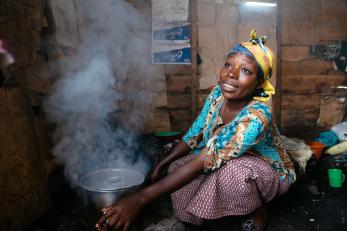Powering Progress: Market Creation Strategies for Solar

In the pursuit of sustainable development and climate resilience, off-grid solar electric cooking (e-cooking) technologies is a dual solution encompassing both climate change mitigation and adaptation strategies.
Globally, cooking with biomass amounts for as much as 2% of CO2 emissions. Moreover, lack of clean cooking contributes to 3.7 million premature deaths annually, with women and children most at risk. The challenge is acute across sub-Saharan Africsca (SSA) where population growth is driving up total greenhouse gas emissions. While per-capita emissions remain far lower across SSA compared to most other regions, energy for cooking accounts for the largest share of household emissions, especially in rural areas.
Given the rapid advances and price reductions in solar e-cooking technologies, there is an opportunity to scale these solutions to help close the emissions gap and deliver a range of co-benefits in support of numerous Sustainable Development Goals.
However, barriers to uptake remain and so a range of supply and demand-side interventions are needed to overcome these, to enable the provision of affordable financing for households to purchase solar e-cooking systems.
Reflecting this challenge, clean cooking targets feature prominently in the Nationally Determined Contributions (NDCs) across Africa, including some explicit targets for e-cooking. However, there are opportunities to highlight this further in revised NDCs and include a broader range of existing e-cooking technologies.
This report highlights the pivotal role of renewable energy for cooking and its critical impact on climate, health, economic development, gender equality, and the local environment in low-income countries. The report builds on the experience of Mercy Corps and Pesitho in Bidibidi, Uganda, demonstrating the potential for photovoltaic (PV)-supported electric cookstoves or electric cooking systems to reach a competitive pricing level for those already paying for liquefied petroleum gas (LPG) or charcoal. Additionally, it highlights the considerable demand among refugee households for such electric cooking products.
In essence, this report serves as a call to action, identifying specific needs and opportunities for both demand and supply-side market activation for solar e-cooking technologies, as a linchpin of climate resilience and sustainable development at the last mile, in the global south. Through collaborative partnerships, policy innovation, and market transformation, we can pave the way towards a more equitable, just and environmentally sustainable future.
This report is published in collaboration with the World Food Programme with contributions from UNITAR-GPA, the Clean Cooking Alliance, Last Mile Climate, the Climate and Clean Air Coalition, IRENA, Modern Energy Cooking Services, and SEforAll.


